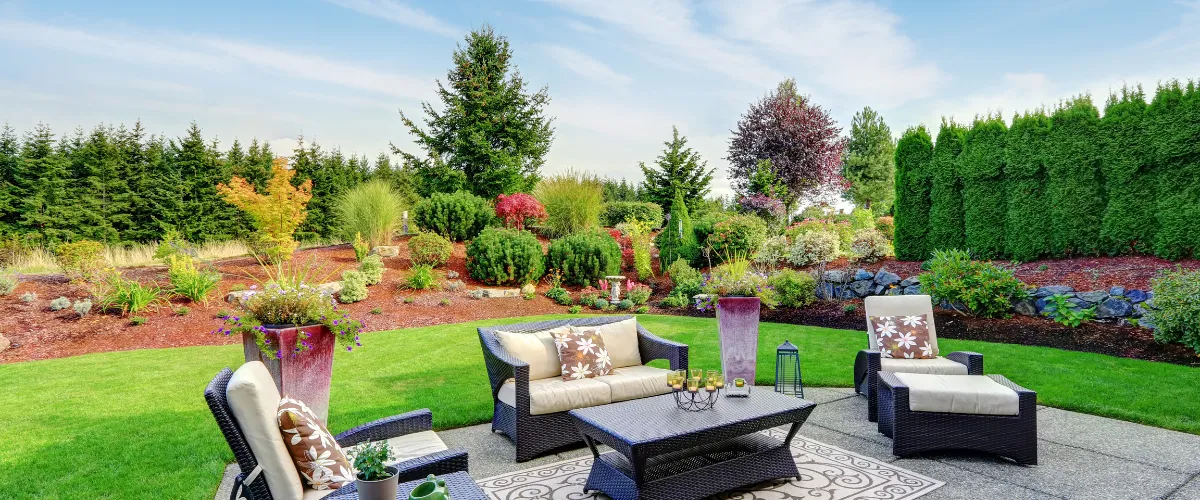Patio vs Deck: Key Differences, Pros & Cons
Choosing between a patio and a deck can be hard. Each offers its own outdoor living space charm. This article explores key differences like cost, maintenance, and design. Read on to find your best fit.

Key Takeaways
- Decks are raised and offer views; they need permits and more upkeep. Patios sit on the ground, cost less to build, and require less care.
- Decks can last around 20 years with care; patios made of concrete might last 25-30 years but could crack over time.
- Adding a deck could boost your home's value by 65-90% when you sell it.
- Patios work best on flat land and offer various design options without needing extra support or permits.
Defining the Spaces
What is a deck and what is a patio? Learn the differences between these outdoor spaces. Understand the defining features that make each space unique.
What is a Deck?
A deck is an outdoor space built off the ground, often attached to a house. It’s made from wood or composite materials. Decks serve as areas for relaxing and entertaining. They can be simple platforms or more complex structures with multiple levels.
Decks need a building permit and inspections to make sure they are safe. People choose decks because they offer views and add value to homes. But, they do require deck maintenance than patios, including power washing and staining.
What is a Patio?
A patio is an outdoor space for relaxing and entertaining. It sits directly on the ground. Patios can be made from various materials like concrete, pavers, stone, or bricks. They work well in flat yards but can also adapt to uneven terrain with extra work.
Patios tend to offer more privacy and require less maintenance over time.
Many choose concrete patios for their low cost per square foot. Others prefer natural stone for its unique look despite higher costs. Patios often do not need permits or inspections, making them a simpler project than decks.
Maintenance usually involves routine sweeping and occasional sealing, depending on the material used.
Key Differences Between Decks and Patios
Decks are typically built with wood or composite decking and often require raised elevation, while patios are constructed on ground level using materials like concrete pavers or stamped concrete.
The installation and maintenance of decks tend to be more labor-intensive and costly compared to the relatively lower construction costs and minimal maintenance required for patios over time.
Installation
Installing a deck often requires more steps than putting in a patio. First, one must build it above ground, which means adding supports and securing it with deck footings. This process usually needs permits and inspections to ensure everything is safe and up to code.
On the other hand, patios sit directly on the flat ground. They can be made from various materials like stone patio or concrete pavers. The preparation involves leveling the surface but does not typically require permits.
This makes the installation of patios potentially quicker and less complex compared to decks.
Maintenance Requirements
Maintenance for decks usually includes regular cleaning, inspecting for rot or damage, and resealing or staining every 2 to 3 years. Wooden decks may need refinishing with a weatherproof sealant, while composite decks generally require less maintenance but should still be inspected and cleaned regularly to avoid mold or mildew buildup.
On the other hand, stone patios may require occasional sealing if they are made of natural stone, while concrete pavers might need occasional weeding and power washing to keep them looking their best throughout the year.
Regular upkeep is key for both patios and decks to ensure their longevity and durability in various climates.
Longevity and Durability
The stair and railing requirements in Indiana for deck building are essential for safety. Guardrails need to be at least 36 inches high, with balusters spaced no more than 4 inches apart.
For stairs, the tread depth must be a minimum of 10 inches, and the riser height should not exceed 7.75 inches. Handrails are required on both sides if a stairway exceeds a width of 44 inches.
All components must be durable and able to withstand a concentrated load of at least 200 pounds applied at any point.
Inspectors will ensure that all stair and railing requirements meet these specifications before issuing permits for deck construction, ensuring compliance with local building codes.
These measures guarantee the safety and structural integrity of decks in Indiana.

Pros and Cons of Decks
Decks offer elevated views and potential for higher resale value.
Offers Elevated Views
A deck provides a higher vantage point to enjoy scenic views from your home. Elevated decks offer homeowners an opportunity to admire their surroundings and nature, such as the garden or nearby landscape.
This elevation can provide a sense of openness and relaxation, making it an appealing option for those who want to enjoy panoramic views from their outdoor space.
In contrast, patios do not typically offer the same elevated perspective as decks due to being constructed at ground level. The height difference between a deck and a patio can make a significant impact on the overall view and ambiance of the outdoor space, which is important for those seeking an elevated perspective from their property.
Potential for Higher Resale Value
Decks can boost your home’s resale value, potentially giving you a better return on investment. Real estate studies have shown that adding a deck to your property can result in an average of 65-90% return at selling time.
Homebuyers often look for outdoor living spaces, and a deck maintenance is known to attract them. Research also indicates that homes with decks tend to sell faster than those without.
Moreover, decks are seen as desirable features in homes within certain price ranges, appealing particularly to families with children or pet owners who prioritize outdoor space. A well-built, visually appealing deck using quality materials can be a major selling point when putting your home on the market.
Requires Permits and Inspections
When starting a deck project, it’s crucial to understand that constructing a deck typically involves obtaining permits and undergoing inspections. The criteria for acquiring permits may vary based on factors like the location, deck size, and elevation from the ground.
These regulations ensure adherence to safety standards, particularly concerning weight limits and structural integrity. For example, in some areas, decks higher than 30 inches off the ground often necessitate permits due to safety considerations.
Inspections are essential during various stages of deck construction, such as after setting footings or before laying decking boards. These steps aim to confirm compliance with building codes and standards for safe use.
Neglecting the necessary permits and inspections can lead to expensive fines or even demolition if non-compliance is discovered post-construction.
Pros and Cons of Decks
Patios tend to have lower construction costs compared to decks. They also require less maintenance over time.
Lower Construction Costs
Decks typically involve higher construction costs compared to patios. Decks often require more materials and labor due to their raised nature, which can increase overall project costs.
On the other hand, patios usually have lower construction costs because they are built at ground level and may not need additional support structures. This cost difference is an important factor for homeowners considering between the two options, as it directly impacts the financial investment required for the outdoor living space.
When comparing decks vs. patios regarding construction expenses, it’s essential to consider your budget constraints along with your desired outdoor features and functionalities to make a well-informed decision.
Less Maintenance Over Time
Patios require less upkeep over time compared to decks. With durable materials like concrete or pavers, a patio needs occasional sweeping and cleaning with a pressure washer to keep it looking its best.
Due to the lack of wood, there’s no need for regular staining or sealing as with decks. This simplicity can save homeowners time and money on maintenance in the long run, making patios an appealing low-maintenance option for outdoor living spaces.
Moreover, homeowners may find that choosing a low maintenance patio can also mean fewer repairs and replacements down the line. This makes patios not just easier to care for but also more cost-effective in the long term than traditional wood decks, offering greater convenience while still providing an attractive outdoor area.
Better Suitability for Flat Terrains
Patios are well-suited for flat terrains, making them a practical choice if your yard has even ground. This makes installation easier and more cost-effective, as it requires less preparation compared to building a deck on uneven ground.
Patios generally don’t need extra structural support or alterations to accommodate flat surfaces, which can be both time-consuming and costly. Furthermore, the uniform nature of flat terrain allows for more freedom in patio designs and layouts without the constraints of managing elevation changes.
Moreover, patios offer better stability and durability when constructed on flat terrain due to the consistent support provided by the stable ground. The absence of uneven surfaces also reduces potential safety hazards associated with tripping or slipping that may occur with raised decks built on irregular landscapes.
With lower construction costs, easier installation, and enhanced safety benefits, patios present an attractive option for homeowners seeking outdoor living spaces in areas with level ground.
Leading Deck and Patio Manufacturers
Several top-tier manufacturers specialize in creating high-quality materials and designs for decks and patios, ensuring durability and aesthetic appeal.
- Trex Company Renowned for eco-friendly, composite decking that mimics wood, offering minimal maintenance and sustainable solutions.
- Fiberon Specializes in composite and PVC deck boards with a wide range of colors to complement any outdoor space.
- TimberTech Offers technologically advanced, weather-resistant materials with a focus on innovative designs and environmental responsibility.
- Pavestone Known for versatile patio pavers that enhance outdoor aesthetics, providing durable and customizable options for all terrains.
- Belgard Provides high-quality patio products, including pavers and retaining walls, focusing on elegant and functional outdoor designs.

Patio Vs Deck - FAQs
What is the main difference between a patio and a deck?
The key difference lies in their construction: decks are usually made of natural wood or pressure-treated lumber, while patios use highly durable materials like concrete or stone.
How do costs compare for building a patio versus a deck?
Both decks and patios have varying costs depending on the materials used. Generally, deck costs can be higher due to the use of premium wood, while patio costs may be lower because they often use less expensive materials.
Can I install an outdoor kitchen or hot tub on both my deck and patio?
Yes, you can install either on both structures but consider weight restrictions especially with decks as they might not support heavy items like hot tubs without proper reinforcement.
Which option requires more maintenance - a deck or a patio?
Decks typically require more upkeep than patios due to weather exposure affecting natural wood over time. Patios made from durable material need less maintenance but watch out for issues such as cracking that could occur over time.
Is choosing between a new deck and a patio just about personal preference?
While personal preference plays part in deciding between decks vs patios, also consider factors like cost, maintenance needs and how you plan to use your outdoor space.
Trust in Our Expertise
Our team has been providing top-tier deck and patio services for over 10 years. Working with our experienced professionals guarantees the highest quality, saving you money long-term.
Ready to start your deck building project here in Indiana? Contact us at (317) 903-2431
